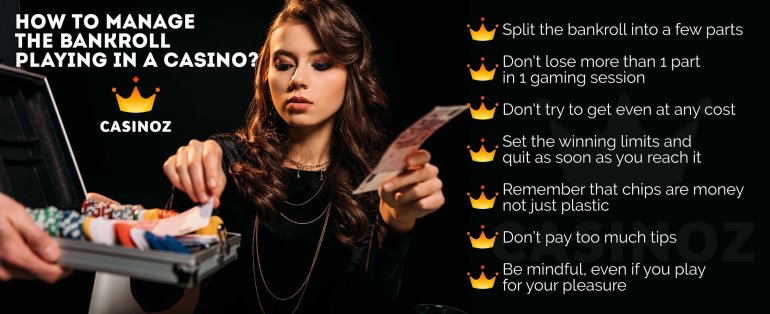
This topic can be revisited again and again because it is one of the most important for any casino client. You can refuse to play complex games, favoring the simplest, but this does not eliminate the need to know how to manage money properly.
If you are careless about managing your finances, you will go home with empty pockets much more often than you might with a sensible approach.
You can not imagine how many experienced gamblers who know everything about their favorite games regularly leave all the money in the casino cash register because they do not know how to manage the bankroll.
Casinoz wants to give you some practical advice on allocating the money for gambling more wisely.
The Importance of Money Management at Casinos
Gambling, when left unchecked and without proper money management strategies, can have severe and far-reaching consequences. Uncontrolled gambling can lead to financial ruin, crippling debt, and strained personal and family relationships.
Financial Ruin and Debt
One of the most significant risks of uncontrolled gambling is the potential for financial ruin. Gambling can become an addictive behavior, and the chase for wins can lead individuals to spend well beyond their means.
Gamblers may drain their savings, accumulate massive debts, without proper budgeting and limits, and face bankruptcy or foreclosure. This financial strain can have a ripple effect, impacting their ability to meet basic living expenses, pay bills, and maintain a stable lifestyle.
Personal and Family Problems
Gambling addiction not only affects the individual but can also strain personal and family relationships. Excessive gambling can lead to neglect of responsibilities, broken trust, and emotional distress within families. As financial resources dwindle, tensions may arise, causing conflicts and rifts between partners, parents, and children.
Additionally, the stress and emotional toll of gambling addiction can contribute to mental health issues, further exacerbating personal and interpersonal problems.
Proper money management is crucial in mitigating these risks and promoting responsible gambling habits. By implementing effective strategies, gamblers can regain control and avoid the detrimental consequences of uncontrolled gambling.
Basic Tips on Money Management for Gamblers
Let's start with helpful tips.
- Never take all the money you have set aside for gambling to the casino. It is no exaggeration to say that this is the golden rule. Never break it. You should divide the bankroll into several parts, planning in advance how often you will visit the casino, how long you will play during the evening, what size bets you will make, and so on.
- You should never spend more money than you allocated for one gambling session. If you lose it, stop. This rule is especially easy to break in online casinos because you do not have to go anywhere for money. But you must learn to restrain your excitement. Do not even allow the thought of trying to win back.
- Decide in advance how much you plan to win that evening. The best way is to set a winning limit as a percentage of the amount you take to the casino. For example, 50% or 100%. Have you managed to reach this goal? Then it's time for you to leave.
- Only count the money. The casino tries to make you forget about money in every possible way. To achieve this, it offers you to play for chips, credits, coins—anything but real money. The less often you hold money in your hands, the easier it is for you to lose your head and start taking desperate risks. Don't let this happen. Keep track of your finances by counting them exactly in dollars, euros, or whatever currency you use.
- Even if the casino is happy to lend you money anytime, never take advantage of this opportunity. Remember this once and for all. It is a sure way to very big losses. The same can be said about money borrowed from other casino visitors.
Of course, not all these tips will help you multiply your bankroll, but they can help you keep it safe.
Here are several reliable online casinos for all types of gamblers.
| Casino | Bonuses | Editors rating | |||
| 100% to 1000 $ x35 |
Play
T&C applies, 18+
|
||||
| — |
Play
T&C applies, 18+
|
||||
| — |
Play
T&C applies, 18+
|
||||
| 100% to 400 $ x50 |
Play
T&C applies, 18+
|
||||
| — |
Play
T&C applies, 18+
|
Setting a Gambling Bankroll
Establishing a reasonable gambling budget is a critical step in practicing responsible money management and mitigating the risks associated with uncontrolled gambling. It is essential to determine a budget based on your disposable income and financial obligations to ensure that gambling activities do not compromise your overall financial well-being.
Determining a Reasonable Budget
When setting a gambling budget, evaluate your disposable income after accounting for essential expenses such as rent/mortgage, utilities, groceries, and other fixed costs. Consider setting aside a small percentage of your remaining disposable income for gambling activities. A general guideline is to allocate no more than 2-5% of your monthly disposable income for gambling. However, this percentage may vary based on your circumstances and risk tolerance.
Calculating a Realistic Budget
To calculate a realistic gambling budget, follow these steps:
- Track your monthly income and expenses: List all your sources of income and fixed expenses to determine your disposable income accurately.
- Prioritize essential expenses: Ensure that your gambling budget does not interfere with your ability to meet essential obligations, such as rent, utilities, or loan payments.
- Consider your financial goals: Factor in your long-term financial goals, such as saving for retirement, emergencies, or major purchases, and allocate funds accordingly.
- Set a reasonable percentage: Based on your disposable income and financial goals, determine a reasonable percentage (e.g., 2-5%) for gambling activities.
- Establish a fixed amount: Calculate the amount you can comfortably afford to spend on gambling each month or week based on the predetermined percentage.
Sticking to the Budget and Avoiding Chasing Losses
Once you have set a gambling budget, it is crucial to adhere to it strictly. Chasing losses or continuing to gamble to recoup previous losses is a dangerous path that can lead to overspending and further financial distress. Establish a firm rule to walk away when you have reached your predetermined budget limit, regardless of winning or losing.
It is also essential to treat your gambling budget as a discretionary expense, not a source of income. Gambling winnings should never be considered a means to recoup losses or supplement your regular income. Maintain a clear distinction between your gambling budget and other essential financial obligations.
By setting and strictly adhering to a realistic gambling budget, you can enjoy gambling as a form of entertainment while minimizing the risks of financial harm. Responsible gambling involves exercising self-control, setting limits, and prioritizing your overall financial well-being.
Bankroll Management Strategies
Effective bankroll management refers to the strategies and techniques used to manage the funds allocated for gambling activities, ensuring that gamblers maintain control over their bankrolls and avoid overspending or chasing losses.
The Buy-in/Re-buy Approach
One popular bankroll management strategy is the "buy-in/re-buy" approach.
This method involves setting aside a fixed amount of money, known as the "buy-in," for a specific gambling session or period.
Once this buy-in amount is exhausted, the gambler should avoid adding additional funds, known as "re-buys," to their bankroll.
This approach helps gamblers maintain strict control over their spending and prevents them from chasing losses or exceeding their predetermined budget.
Session Bankrolls
Session budgets are another effective bankroll management technique. This strategy involves allocating money for a particular gambling session or period, such as a day or a weekend trip.
The session bankroll is the maximum amount the gambler is willing to risk during that session.
Once the session bankroll is depleted, the gambler should stop and walk away, regardless of their wins or losses.
This approach helps gamblers maintain discipline and avoid overspending.
Stop-Loss Limits
Stop-loss limits are crucial for mitigating losses and preventing gamblers from chasing their losses excessively.
A stop-loss limit is a predetermined threshold at which a gambler stops gambling for the session or period, regardless of their bankroll balance.
For example, a gambler may set a stop-loss limit of $500, meaning they will walk away and not risk additional funds if they lose $500 during a gambling session.
By implementing these bankroll management strategies, gamblers can maintain control over their bankrolls and avoid going over their budgets. The buy-in/re-buy approach prevents gamblers from continuously adding funds to their bankroll, while session bankrolls and stop-loss limits help set clear boundaries and limits on potential losses.
Another Notice on Bankroll Management
In most cases (except card counting in blackjack), you must understand that financial management does not affect the house edge percentage in a particular game.
You can try to change the slot machines at the first win, bet on a progression, catch a winning wave, and divide the entire bankroll into equal parts - all this will help increase the theoretical return. The house edge is the same at a bet of a thousand dollars or a dollar.
You may ask, why then use it?
In order to keep the situation under control and not spend more than you can afford, although it certainly is not the only reason to learn how to properly manage funds in the casino.
Read on for another tip.

Money Management for Different Types of Gamblers
As you know, financial management in the casino does not affect the theoretical payback in games of chance. However, it can help you choose the plan that best suits your playing style. Here is an example.
- Let's say you have come to the casino for rest and fun. You do not chase big winnings but do not want to lose all your money. Therefore, you need to minimize the risk of total loss. Choose the bet size you can play without risking losing your bankroll.
- But there are other situations. Some customers are looking for casino thrills. They do not enjoy low-volatility games and tiny payouts. They do not get pleasure from the process and are ready to take risks anytime. We can recommend an aggressive betting system with numerous bet changes. It's a significant risk, but they come to the casino for it.
- Many casino customers, having a solid bankroll, are satisfied with small wins. For them, the main thing is the result. If you fall into this category, keep emotions under control and increase bets very smoothly. In general, go to the goal at a leisurely pace.
However, players of all types must adhere to the guidelines described earlier in this article. You can make large or small bets, play aggressively or restrained, stay at a casino for five minutes or a whole day, but you should never go beyond the established limits or borrow money to continue gambling.
Be reasonable. Only in this case will the game in the casino not become a bummer.
Meet these internet casinos holding licenses from reputable gambling regulators.
Conclusion
Proper money management is essential for responsible gambling. It involves setting a realistic budget based on disposable income, implementing effective bankroll management strategies, taking breaks to maintain clarity, and knowing when to walk away from gambling activities.
Failure to manage one's bankroll effectively can lead to severe consequences such as financial ruin, crippling debt, and strained personal and family relationships. Uncontrolled gambling can quickly deplete savings, result in the accumulation of massive debts, and potentially cause bankruptcy or foreclosure. Additionally, it can neglect responsibilities, break trust, and cause emotional distress within families.
The above-mentioned methods and practices can help mitigate these risks. Taking breaks during sessions can prevent impulsive decisions while recognizing signs of problematic behavior and setting loss limits can help gamblers walk away before situations escalate.
Adopting a mindset of responsible gambling is crucial for protecting your financial well-being and personal relationships. It involves exercising self-control, setting clear boundaries, and prioritizing your overall financial stability over the thrill of gambling. Remember, gambling should be treated as a form of entertainment, not a means to generate income or recoup losses.
By embracing proper money management strategies and responsible gambling practices, you can enjoy gambling activities while minimizing the risks of financial harm and personal turmoil. Prioritize your financial well-being, set reasonable limits, and make informed decisions to maintain a healthy relationship with gambling.

















































